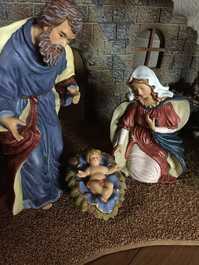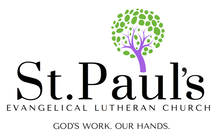A Baby Changes Us Luke 2:1-22 A baby has the power to change us. A commercial that’s been running recently pictures a man who says that he wanted to quit smoking but never could … until he held his daughter in his arms. I’ve heard similar stories in my family … and maybe your family as well. A baby has the power to change us … our behavior, our habits and rituals. Babies can bring us back to church after being away for years. Motivate us to seek out the benefits of faith and baptism for us and our children, wanting them to know the Bible and how it speaks of God’s love for them. Babies upset routines and sometimes even plans for our life. Babies can help us re-order our priorities and re-consider our values. Babies even have the power to change the lives of aunts and uncles and close friends who aren’t even related that baby. There’s something powerful and transformative about holding helpless, dependent, human beings in our arms, staring into the eyes of a grinning child. Babies have the power to make us care.
Of course a baby changes no one more than that baby's mother. Babies change mothers physically and physiologically. A report appeared in The New York Times this week about a recent study that looked at the changes that take place in a woman’s brain during pregnancy. By comparing MRI data before, during and after pregnancy, the researchers observed changes in the maternal brain, and the thinking is that the brain itself is changed by pregnancy, specializing to equip the mother for the new role she will play in caring for her child and helping strengthen the mother and child bond. And we have known for years how the body’s own chemistry helps form attachment and intense feelings of love and wonder between mother and child. Babies change us in profound ways. The Christmas Gospel is the story of Mary giving birth to her first born child, a son. It tells the story in ways that we might tell our children about the events that surrounded their own birth. This birth is special, though, because of what we learned about Mary and the baby she is carrying even before we get to the story of Jesus’ birth. We learn that Mary is visited by an angel who tells her that she will conceive and bear a child from the Holy Spirit. She is to name this child Jesus — which means God saves. He is the promised Messiah who redeems us. So, from conception we know that Jesus is divine. Yet, even though we celebrate this birth as the incarnation of the Son of God, the incarnation itself, the enflesh-and-blood-ment of this child means that this pregnancy and this birth transformed and changed Mary even as the incarnation changes God ... how we know and related to God. Jesus is fully and completely human. And in this instant of birth, a human baby. Mary is his mother, and as we know … babies change us … even as we do the dirty work of changing the baby. Think of it … the God who in all of scripture has lived in impenetrable light and glory; the God that Moses cannot see or behold; the God who created the universe … is now the care of young woman who in doing for her newborn what all mothers must do for their newborns. What better way to illustrate the change in the relationship between human beings and their God, than to fix in our mind this image of Mary caring for Jesus. Notice this change displayed in a small but important detail in this story: Mary wrapped Jesus in bands of cloth and laid him in a manger. We know this is a tender moment, filled with love and care. Anyone who has been tasked with swaddling and comforting a crying child knows this can be no clinical wrapping, even though the new mother might approach this task with fear and trembling, afraid she might break this small helpless creature. We know that this swaddling, wrapping in strips and cloths and laying the child in a warn and comfortable manger is something she does for the love and comfort and sake of this baby. That her whole body surges and responds with love for this child in these first hours after birth. God has humbled himself to be cared for — and in such an intimate way — by Mary, now and forever acclaimed as Mother of God. But there is more wrapped into this story. Even while Mary wraps Jesus in bands of cloths, she is caring for the body of God who has now wrapped himself in human flesh. The distant and mysterious has become the close and familiar. No less holy. No less divine. No less powerful. Yet humble and visible, manifest and made known in this baby, then child, then man … Jesus. In taking on our human body and coming to dwell and abide with us in the flesh, God shows how much God loves us, even if we have failed to love our God. Even on so beautiful a night as tonight, we know that something has gone wrong with this world and these bodies of ours. Sin and death have corrupted us. What God had created good has gone bad, turned away from God … and we suffer the consequences every day. And at no point more deeply than at death. The circle of life is the cruel. We lose all that we love in death. Jesus, too, dies. Crucified. In his flesh he suffers our death and after breathing his last breath … a word of absolution, Father forgive them, the body of Jesus is lovingly wrapped in strips of cloth and laid to rest in the safety of a borrowed shelter once again. We might place these two pictures side by side in our hearts. The image of Mary with her baby wrapped in strips of cloths and lying in the manger and image of the pieta. Mary, holding the lifeless body of Jesus, as they prepare to wrap him again in strips of cloth and lay him to rest in his tomb. By his death. Jesus takes away our death … forgives us all our sins … bears the corruption of our flesh to the end, humble and pleased to abide with us, to be cared for once again. Laid to rest. Yet, when the women return early on Easter morning, they find the cloths, … the grave cloths, but they do not the flesh, the body of the Lord. Still wrapped in our skin and bone, Jesus rises from the dead for us. The risen Jesus … still in flesh … is the guarantee that by his resurrection Jesus has redeemed all flesh from sin and death. The risen Christ is the vision of the future won by Jesus’ death and resurrection, God’s victory that is set in motion here at Jesus’ birth. A week after Jesus is raised from the dead …. Thomas, the skeptic, the doubter, will demand to see and touch where his flesh was wounded for our sake. And when Jesus appears to him and he sees the holes made in his fleshy hands and feet by the nails and the pierced side, Thomas exclaims … my Lord and my God! Which is precisely what the shepherds heard from the angels and now proclaim to the all who listen themselves. That this baby is your Lord and your God … who has taken on our human condition to redeem us and our flesh and bone and blood as good and loved by God … who has come to be God with us, once again. and forever. Babies have the power to change us. But this baby … Jesus, has power above all others. He has the power to take away our sin and transform us from what we are now into what he is now … a glorious child of God, redeemed in in our flesh and blood by his own body and blood. But that was God’s plan all along. Amen.
0 Comments
Your comment will be posted after it is approved.
Leave a Reply. |
NewsThe latest news, sermons and commentary on our life in mission together. Archives
May 2021
Categories |

 RSS Feed
RSS Feed
